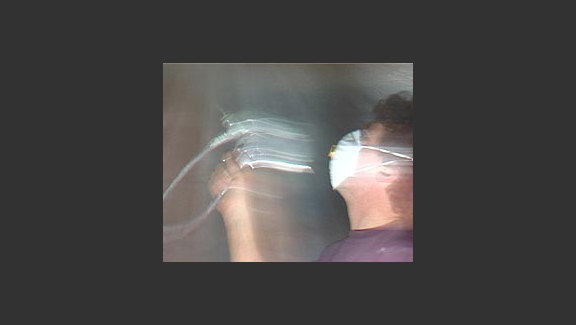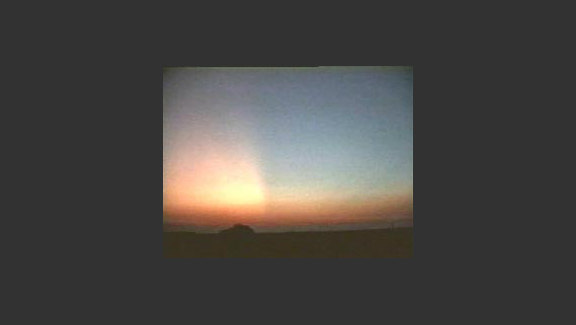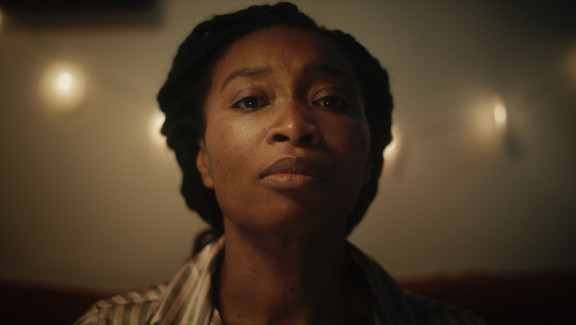Blue Summer
Synopsis
Exploring a number of contemporary concerns - the media, modern art, digitalisation, modernism, ecology - the film experiments with filmic genres and uses image and sound to mirror the writer's descent into madness. Writer-director John Sergeant, who has made over 30 documentaries for both the BBC and Channel 4, shot the film over five years on a tiny budget. "I wanted to make a film on my own terms rather than going through the commissioning process, which I know can completely change a writer-director's original idea," says Sergeant. "I've seen a lot of great ideas destroyed by the commissioning process and there are only a few film-makers - Adam Curtis, Patrick Keiller and Chris Petit - who manage to manipulate the system to their own advantage."
That uncompromising approach has won the film fans around the world. Following its premiere at last year's Sheffield International Documentary Festival, it was invited to London, Rotterdam, Zanzibar and Ankara, and has also enjoyed special screenings at arthouse cinemas around the UK, all as a result of word of mouth.
===
***
The Blue Summer is an experimental feature film about a writer's doomed attempt to understand his lover and her art via an increasingly tormented contemplation of the media, contemporary art, digitalisation, and the countryside. The writer is called Bill, the artist, Sarah.
Following a title sequence suggesting some kind of crisis in the modernist dream, an offscreen, unnamed narrator describes how he once discovered a pile of letters and the remnants of a failed writing project in a derelict trailer home on the edge of a wood. The body of the film (based on several intertwined true stories and illuminated by on-screen text), comprises the carefully illustrated narration of these writings.
Shot in a deliberately picture postcard style, the film is paced to try and reflect the slowly changing nature of rural time and shows off the magnificent midsummer countryside of the Welsh Marches. On occasion this material is interrupted by handheld footage of particular rural adventures and encounters, and by archive and motorway-based daydreams or reveries.
By the last stages of the film the divisions between the various types of reality contemplated by Bill the writer are collapsing. Sections repeat, get in the wrong order, and following his bad news from Sarah, get apocalyptically crazy. In the last scene in the country therefore, the wild Lear-type storm is as much digital as it is 'natural', and a wild meander through a rain storm ends in an apparent suicide attempt in the nearby river.
Details
- Year
- 2000
- Type of film
- Features
- Director
-
John Sergeant
- Composer
- Jon Wozencroft, Isa Suarez, Johnny Bassett.
- Dir
- John Sergeant. 2000. DigiBeta/Beta. 129mins. Email: j_sergeant@yahoo.co.uk Prod/scr/doP: John Sergeant. Prod des: Owen Lodge/Underbelly, Richard Bonner Morgan. Ed: Paola Cottrell, Stephanie Neth. Main cast: Barney Kay, Nicola Walker, John and Edna Ferneyhough, Ade Williamson, Jack Ferneyhough, Joe Godding. Budget: £19,000. Funding: Private sources, London Production Fund.
Categories
Production Status
Production Company
JOHN SERGEANT 39 Herne Hill House Railton Road London SE24 0EF Tel: (44) 20 7737 2222 Fax: (44) 20 7737 0200
Page updates
This page was last updated on 12th May 2025. Please let us know if we need to make any amendments or request edit access by clicking below.
See also
You may also be interested in other relevant projects in the database.
 The Brittany Job
The Brittany Job
Director: John Sergeant
Year: 2006
The Brittany Job is a documentary feature about two 'toshers' decorating a house in France. Deliberately twisting the makeover show format, the film explores their ambivalent and often comic relationship, unusual painting techniques, the creative process, and above all, colour.
 The Blue Summer
The Blue Summer
Director: John Sergeant
Year: 2000
Described by The Independent as a "millennial British version of Chris Marker's Sunless", Blue Summer is an experimental film about the doomed love affair between a writer and his conceptual artist lover. An unseen narrator guides us through the story, describing how he unearthed a pile of letters and fragments of a novel in an abandoned trailer in the countryside. Slowly, these fragments come to life, revealing how the writer's paranoid fantasies provoke a psychological meltdown. Exploring a number of contemporary concerns - the media, modern art, digitalisation, modernism, ecology - the film experiments with filmic genres and uses image and sound to mirror the writer's descent into madness. Writer-director John Sergeant, who has made over 30 documentaries for both the BBC and Channel 4, shot the film over five years on a tiny budget. "I wanted to make a film on my own terms rather than going through the commissioning process, which I know can completely change a writer-director's original idea," says Sergeant. That uncompromising approach has won the film fans around the world. Following its premiere at last year's Sheffield International Documentary Festival, it was invited to London, Rotterdam, Zanzibar and Ankara, and has also enjoyed special screenings at arthouse cinemas around the UK, all as a result of word of mouth.
 No Women No Children
No Women No Children
Director: Akporé Uzoh
Year: 2025
The aftermath of a sexual assault (rape). Exploring the deep-felt consequences for all involved. At its heart an epic story of a couple's fight for the survival of their love.